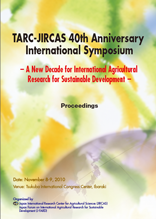Outcome of GCARD and Role of ARI

The Global Conference on Agricultural Research for Development (GCARD) identified the
changes required in research and innovation systems so that millions of hitherto unreached small,
resource-poor farmers can benefit from environmentally-sustainable productivity growth and increase
their food security and incomes to tackle the root causes of rural poverty. The transformation of
agricultural research for development (AR4D) requires attention to both: (i) collective research and
knowledge sharing actions on key outcome-focused themes and (ii) transformation and strengthening
of agricultural innovation systems of developing countries.
The GCARD had prepared a roadmap, the Montpellier Road Map, which aims to transform
Agricultural Research and Innovation Systems globally, from their current fragmented status to a more
cohesive system. Its goal is that agricultural knowledge, science and technology should play their
fullest possible role in abolishing poverty and hunger from the developing world and it builds on the
following nine pillars identified for good practice:
1. Inclusively define key research priorities and take forward large-scale research-for-development
partnerships, driven by national and regional sustainable development objectives and recognizing
the particular needs of resource-poor farmers;
2. Recognize that innovation is a continually evolving process that must be shaped by science and
society to anticipate future needs;
3. Effectively coordinate operational linkages with and among donors and development partners to
maximize development impacts;
4. Directly involves producers, users and consumers in controlling and conduction research and
fostering the rapid sharing of learning;
5. Recognize the complex innovation pathways in outcome-based research and invest in equitable
partnership among all stakeholders with shared objectives, mutual accountability and clear
understanding of interests, roles and responsibilities;
6. Actively achieve increased investment in human, institutional and financial resources;
7. Develop required institutional capacities for generation and use of scientific and technical
knowledge in agricultural development;
8. Stimulate multi stakeholder and multispectral engagement to create enabling environments for
required better impact; and
9. Demonstrative value and gain recognition by society through effective monitoring, evaluation and
reporting.The Global Forum on Agricultural Research (GFAR), a multi-stakeholder catalyst for: (i)
advocacy for change; (ii) institutions for the future; (iii) inter-regional learning; and (iv) knowledge
for all, as endorsed by the G8 Summit 2009, working through the Regional Fora viz. APAARI, NARS
and other constituent sectors will strengthen the above nine pillars and build on them the new AR4D
worldwide.
| Date of issued | |
|---|---|
| Creator | Ram Badan Singh |
| Publisher | Japan International Research Center for Agricultural Sciences |
| Available Online | |
| Issue | 2010 |
| spage | 23 |
| epage | 30 |
| Rights | Japan International Research Center for Agricultural Sciences |
| Language | eng |
